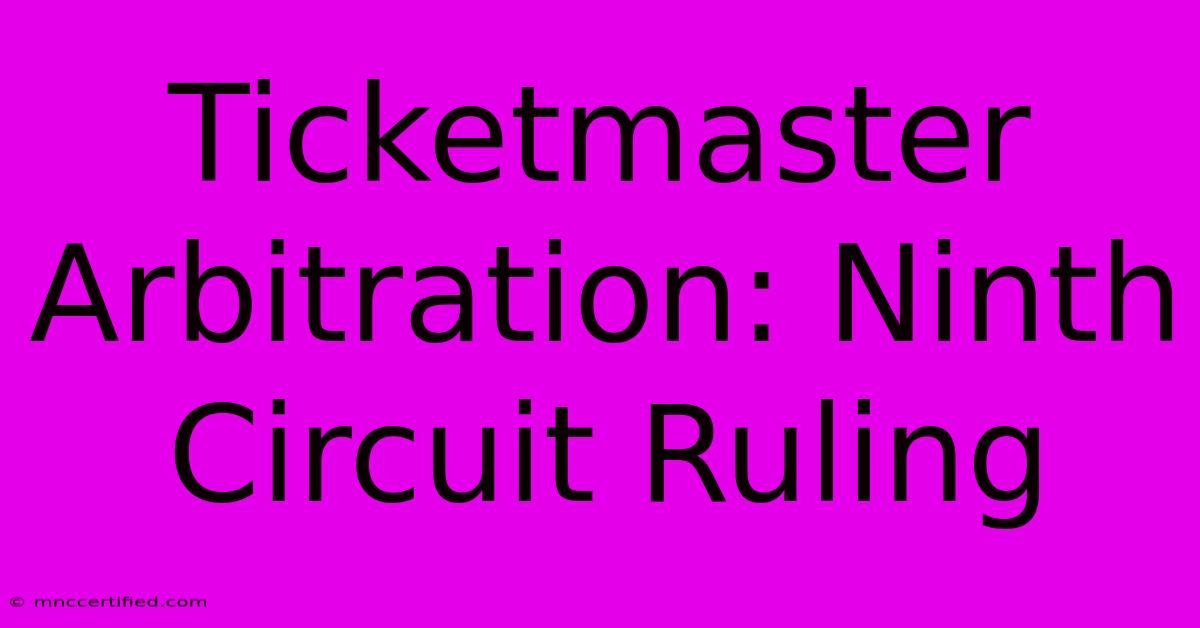Ticketmaster Arbitration: Ninth Circuit Ruling

Table of Contents
Ticketmaster Arbitration: Ninth Circuit Ruling – A Deeper Dive into the Implications
The Ninth Circuit Court of Appeals' recent ruling on Ticketmaster's arbitration clause has sent ripples through the entertainment industry and consumer protection landscape. This decision significantly impacts how companies can utilize mandatory arbitration clauses in their terms of service, particularly concerning the enforceability of class-action waivers. This article delves into the specifics of the ruling, its implications for consumers and businesses, and the ongoing debate surrounding mandatory arbitration.
Understanding the Ninth Circuit's Decision
The core issue revolved around Ticketmaster's use of mandatory arbitration clauses in its terms of service, which included a waiver of class-action lawsuits. This essentially meant that individual customers who felt wronged by Ticketmaster were forced to pursue their claims individually through arbitration rather than joining a class-action lawsuit. The Ninth Circuit's decision focused on whether this waiver was unconscionable, meaning it was so unfair as to be unenforceable.
The court found that Ticketmaster's arbitration clause was indeed unconscionable under California law. Key to this decision was the power imbalance between Ticketmaster, a massive corporation, and its individual customers. The court highlighted the significant cost and inconvenience associated with individual arbitration compared to the potential benefits of a class-action suit. Essentially, the court argued that the structure of the clause, in conjunction with the disparity in power, made it impractical for consumers to pursue their individual claims, effectively rendering the consumer protection mechanisms useless.
Key Factors Leading to the Ruling
Several factors contributed to the Ninth Circuit's decision:
- Procedural Unconscionability: This refers to the process by which the arbitration clause was presented to consumers. The court likely considered whether the clause was buried within lengthy, complex terms of service, making it difficult for consumers to understand its implications. The lack of transparency played a significant role.
- Substantive Unconscionability: This examines the fairness of the arbitration clause itself. The court focused on the substantial costs and inconvenience associated with individual arbitration, effectively creating a barrier to redress for consumers. The waiver of class action rights was deemed particularly problematic in this context.
Implications for Businesses and Consumers
This ruling has significant implications for both businesses and consumers:
For Businesses: Companies relying on mandatory arbitration clauses with class-action waivers need to carefully re-evaluate their terms of service. The Ninth Circuit's decision emphasizes the need for transparency and fairness in such clauses. Simply having an arbitration clause is not sufficient; it must be demonstrably fair and easily understood by consumers. Failure to comply could result in the clause being deemed unenforceable. This ruling specifically impacts businesses operating in California but could influence similar cases nationwide.
For Consumers: The ruling offers a potential pathway for consumers to challenge unfair arbitration clauses. It reinforces the importance of carefully reviewing terms of service and understanding the implications of such clauses. While not a guarantee of success in every case, this decision offers a legal precedent that can be cited in future challenges to similar clauses across various industries, not just the entertainment sector.
The Broader Context: Mandatory Arbitration and Consumer Protection
The ongoing debate about mandatory arbitration and its impact on consumer protection is complex. Proponents argue that arbitration offers a faster, cheaper alternative to litigation. However, critics highlight the inherent power imbalance between businesses and consumers, leading to concerns about fairness and access to justice. This ruling underscores the need for a careful balance, ensuring that mandatory arbitration doesn't become a tool to shield businesses from accountability.
Conclusion: A Shift in the Landscape
The Ninth Circuit's ruling on Ticketmaster's arbitration clause represents a significant development in the ongoing discussion surrounding mandatory arbitration and consumer protection. It emphasizes the importance of fairness and transparency in contract terms, particularly concerning class-action waivers. While the specific impact remains to be seen, this decision serves as a cautionary tale for businesses and a potential win for consumers seeking to challenge unfair arbitration clauses. The future will undoubtedly see more legal battles testing the boundaries of these clauses and their enforceability across various industries. This ruling adds to the body of case law helping to define the limits of acceptable arbitration clauses.

Thank you for visiting our website wich cover about Ticketmaster Arbitration: Ninth Circuit Ruling. We hope the information provided has been useful to you. Feel free to contact us if you have any questions or need further assistance. See you next time and dont miss to bookmark.
Featured Posts
-
Alliance Insurance Centers Llc
Nov 27, 2024
-
Kansas Vs Duke Live Score Vegas Update
Nov 27, 2024
-
Feyenoord Vs Man City Ucl Live Stream
Nov 27, 2024
-
Senior Benefits Life Insurance
Nov 27, 2024
-
Wednesdays Win Pressure Builds On Tim
Nov 27, 2024